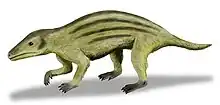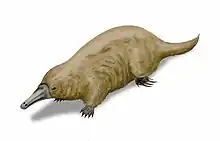Tinodontidae
Tinodontidae is an extinct family of actively mobile mammals, endemic to what would now be North America, Asia, Europe, and Africa during the Jurassic and Cretaceous periods.[1][2]
| Tinodontidae Temporal range: Jurassic to Cretaceous, | |
|---|---|
| Scientific classification | |
| Domain: | Eukaryota |
| Kingdom: | Animalia |
| Phylum: | Chordata |
| Class: | Mammalia |
| Clade: | Theriiformes |
| Family: | Tinodontidae Marsh, 1887 |
| Genera | |
| |
Taxonomy
Tinodontidae was named by Marsh (1887). It was assigned to Mammalia by Marsh (1887); and to Symmetrodonta by McKenna and Bell (1997).[3] More recently, they have been recovered as more basal to symmetrodonts, though still within the mammalian crown-group.[4]
References
- PaleoBiology Database: Tinodontidae, basic info
- "MESOZOIC MAMMALS; Tinodontidae and Spalacotheriidae, an internet directory".
- O. C. Marsh. 1887. American Jurassic mammals. The American Journal of Science, series 3 33(196):327-348
- S. Bi; Y. Wang; J. Guan; Z. Sheng; J. Meng. (30 October 2014). "Three new Jurassic euharamiyidan species reinforce early divergence of mammals". Nature. 514 (7524): 579–584. doi:10.1038/nature13718. PMID 25209669. S2CID 4471574. Retrieved 13 September 2022.
This article is issued from Wikipedia. The text is licensed under Creative Commons - Attribution - Sharealike. Additional terms may apply for the media files.



